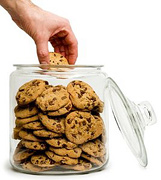Curb the Cravings
By Peter W. Crownfield
What's your favorite food craving? Chocolate, potato chips or fast food? Winter is prime time for food cravings. To make your New Year's resolutions work for you, learn how to curb your appetite for the foods you think you want, but definitely don't need to be eating.
Here's an all-too-familiar scenario for the average American: It's 7 p.m. and you're glued to the couch. Despite the fact that you only finished dinner a few hours ago, the hunger pangs are in full swing. Your cravings are fueled not necessarily by the fact that you're actually hungry, but because you've been "forced" to endure a veritable slew of food-related TV commercials. Now you're consumed by thoughts of cheeseburgers, ice cream and gooey microwavable snacks. Inevitably, you give in to the urges and head to the kitchen or nearby fast-food joint.
Your food cravings also might be caused by what you've eaten (or not eaten) that day. If you didn't eat enough or consumed too many processed, carbohydrate-laden foods, your body never really got the nutrition it needed to feel full. And of course, there are other common causes of cravings, including dieting, lifestyle and stress. No matter the cause, the reality is that cravings often lead to overeating - usually of high-fat, nutrient-deficient foods - which takes its toll on your health over time. What can you do to help curb the cravings? Here are some simple tips to keep in mind.
 Start the day right. An abundance of evidence suggests eating a hearty, healthy breakfast helps limit cravings throughout the day. According to a University of Texas at El Paso study, people who ate breakfast consumed 5 percent fewer calories than those who skipped the meal. Of course, you can't pig out on simple carbohydrates and processed foods for breakfast, because all that will do is spike your blood sugar, leading to hunger pangs by mid-morning. A good rule of thumb is to eat some form of protein and complex carbohydrate (whole grains, etc.) every morning.
Start the day right. An abundance of evidence suggests eating a hearty, healthy breakfast helps limit cravings throughout the day. According to a University of Texas at El Paso study, people who ate breakfast consumed 5 percent fewer calories than those who skipped the meal. Of course, you can't pig out on simple carbohydrates and processed foods for breakfast, because all that will do is spike your blood sugar, leading to hunger pangs by mid-morning. A good rule of thumb is to eat some form of protein and complex carbohydrate (whole grains, etc.) every morning.
Perhaps the best evidence in favor of eating a healthy breakfast comes courtesy of the National Weight Control Registry: a list of people who've lost at least 30 pounds and kept it off for a year or more. Nearly 78 percent of those 3,000 people regularly eat a morning meal. A coincidence? Not likely.
Bring on the water. Water has several important benefits in terms of curbing food cravings. First, your stomach can only handle so much of anything at one time, whether it's liquid or solid. Drinking a glass or two of water before eating means you get full quicker - making it less likely you'll be able to gorge (without feeling awful afterward). Foods with high water content (like cucumbers, celery, watermelon and orange slices) achieve the same result, according to Dr. Hollie Raynor of Brown University's Weight Control and Diabetes Research Center.
Second, drinking water increases your body's ability to burn calories, say German researchers, who found that people who drank 17 ounces of water burned approximately 30 percent more calories in the subsequent 90 minutes. Who knew doing something as simple as drinking water could actually help you lose weight and curb cravings?
Know yourself. This requires a bit of self-discipline. Pay attention to your cravings. Do they happen at the same time every day? Do they happen during a certain activity or when you are with a certain group of people? If 7:30 p.m. is the time your worst cravings kick in, make sure you are doing something during that time besides hanging around the kitchen, waiting to give in to temptation. Play a game with your kids, help them with their homework, or better yet, head to the gym for a quick workout.
Easier said than done, to be sure, but sometimes, a little diversion is just what you need to avoid eating yourself out of house and home. The busier you are, the less time you have to think about that mouthwatering chili-cheese dog. Just make sure you aren't so busy that you don't have time to eat healthy, consistent meals, because otherwise, you'll just revert to your bad eating habits.
Practice portion control. In a world of ever-increasing portion sizes, it's important to eat in moderation. This is true no matter what you're eating, but it's particularly important when you're eating high-calorie, high-fat and/or high-sugar foods. It might be hard at first, but get in the habit of eating a few slices of pizza, not half the pie, or a small bowl of ice cream for dessert instead of a half gallon.

